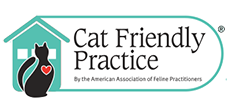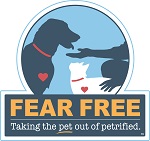 “Tis the season”, of thunderstorms, lightning and fireworks. And for many pets, this means it is also a season of high anxiety, stress and fear.
“Tis the season”, of thunderstorms, lightning and fireworks. And for many pets, this means it is also a season of high anxiety, stress and fear.
Noise phobias are certainly more common in dogs, but can also be an issue in cats. Cats tend to hide when they are anxious, so pet owners may not realize that their cat is afraid. Dogs on the other hand may become clingy, tremble or shake, pace nervously, whine or become destructive. Noise phobias may be mild or they can be quite severe and may escalate as a pet gets older. Many pets will start to show anxiety signs before a storm even starts and may get anxious if it gets windy or if there are changes in barometric pressure before a storm.
So – what can be done? Noise phobias can be difficult to combat, and what works for one pet may not work for the next. When these phobias have been going on for several years, they can be more difficult to get under control. Below are some things to try if your pet experiences noise phobias. Remember that helping this issue can take time, patience and trial and error. In most cases, a multimodal approach will be the most effective.
- Close windows and curtains to reduce outside stimuli during storms or fireworks
- Turn up the volume on the TV or radio or provide “white noise”. This can be in the form of a high speed fan, white noise machines or apps like Simplynoise.com

- Use pheromones like Adaptil (for dogs) or Feliway (for cats). These calming pheromones can help anxious animals feel more calm.
- Products like Thundershirts, calming caps or happy hoodies can help some animals feel less anxious. Thundershirts help by applying gentle, calming pressure and calming caps or happy hoodies work by reducing noise or visual stimuli
- Some animals will respond favorably to natural calming supplements like Composure pro. Composure pro chewable treats can be given daily or as needed and the dose can be doubled or tripled during stressful events.
- Prescription medications may be needed in some cases. These are most effective if also used with behavior modification techniques to condition the pet to the noises that frighten it. Medications can help pets to attain significant relief from anxiety and can help to prevent the escalation of these fears.
- Working with an animal behaviorist. This can be tremendously helpful in finding things that work best for your pet. They will devise a plan that takes your pet’s past experiences and anxiety levels into consideration and will help guide you in things that may be helpful for your unique situation.
Even though noise phobias are not easy to “cure”, they often can be helped using a variety of these methods. Doing nothing often causes the problem to escalate and worsen over time. Early intervention is the most effective, however even severe cases can usually be helped to some degree. Planning ahead for storm season or the 4th of July is key and having a plan in place will help your pet to cope better and experience less fear, anxiety and stress.




